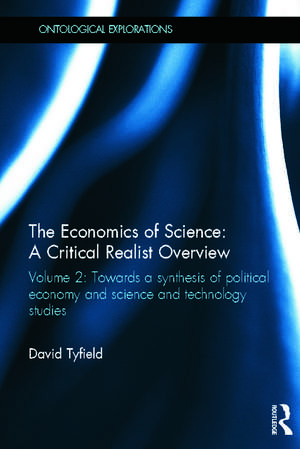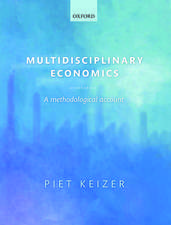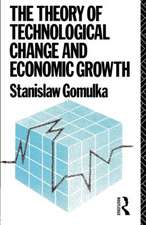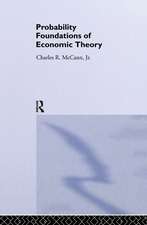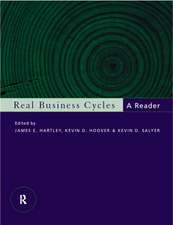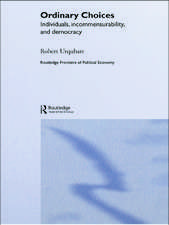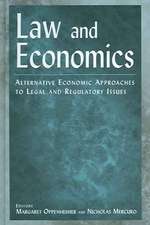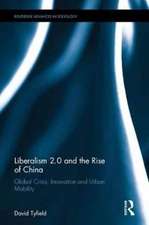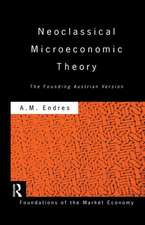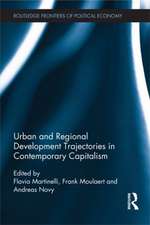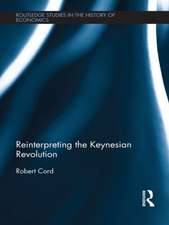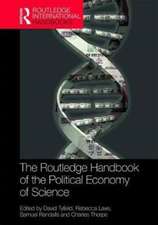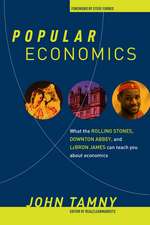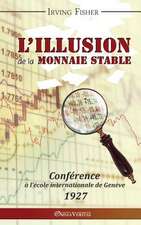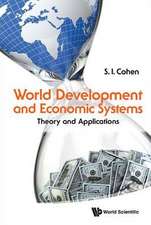The Economics of Science: A Critical Realist Overview: Volume 2: Towards a Synthesis of Political Economy and Science and Technology Studies: Ontological Explorations (Routledge Critical Realism)
Autor David Tyfielden Limba Engleză Hardback – 21 noi 2011
This book argues that the fundamental underlying problem in all cases is the ontological shallowness of these theories, which can only be remedied by attention to ontological presuppositions. Conversely, a critical realist approach affords the integration of a realist political economy into the analysis of the economics of science that does afford explicit attention to these crucial questions; a ‘cultural political economy of research and innovation’ (CPERI). Accordingly, the book sets out an introduction to the existing literature on the economics of science together with novel discussion of the field from a critical realist perspective. In arguing thus across levels of abstraction, however, the book also explores how concerted engagement with substantive social enquiry and theoretical debate develops and strengthens critical realism as a philosophical project, rather than simply ‘applying’ it.
While the first of these two volumes argues how mainstream economics is inadequate to the task of an explanatory and critical ‘economics of science’, the challenge in this second volume is to examine the strengths and weaknesses of disciplines offering more promising starting points. Two social scientific disciplines are particularly promising candidates, starting from ‘economy’ or ‘science’, namely heterodox political economy and science & technology studies respectively. Synthesising these into an ‘economics of science’, however, still encounters considerable hurdles, in that there remain some fundamental and mutual philosophical incompatibilities. Formulating an ‘economics of science’ thus demands that both ‘economics’ and ‘science’ be redefined. The book explores how a critical realist approach affords some common ground upon which this productive synthesis may be pursued, in the form of a cultural political economy of research and innovation (CPERI).
| Toate formatele și edițiile | Preț | Express |
|---|---|---|
| Paperback (2) | 213.77 lei 6-8 săpt. | |
| Taylor & Francis – 19 mai 2014 | 213.77 lei 6-8 săpt. | |
| Taylor & Francis – 21 noi 2011 | 415.24 lei 6-8 săpt. | |
| Hardback (2) | 516.06 lei 6-8 săpt. | |
| Taylor & Francis – 21 noi 2011 | 516.06 lei 6-8 săpt. | |
| Taylor & Francis – 21 noi 2011 | 1223.89 lei 6-8 săpt. |
Din seria Ontological Explorations (Routledge Critical Realism)
- 8%
 Preț: 425.29 lei
Preț: 425.29 lei -
 Preț: 340.37 lei
Preț: 340.37 lei -
 Preț: 326.49 lei
Preț: 326.49 lei -
 Preț: 300.53 lei
Preț: 300.53 lei -
 Preț: 371.47 lei
Preț: 371.47 lei - 26%
 Preț: 821.10 lei
Preț: 821.10 lei - 26%
 Preț: 817.51 lei
Preț: 817.51 lei -
 Preț: 488.33 lei
Preț: 488.33 lei -
 Preț: 461.86 lei
Preț: 461.86 lei - 23%
 Preț: 320.80 lei
Preț: 320.80 lei - 18%
 Preț: 1058.43 lei
Preț: 1058.43 lei - 25%
 Preț: 937.61 lei
Preț: 937.61 lei -
 Preț: 438.14 lei
Preț: 438.14 lei - 17%
 Preț: 270.20 lei
Preț: 270.20 lei -
 Preț: 413.33 lei
Preț: 413.33 lei - 18%
 Preț: 1115.51 lei
Preț: 1115.51 lei -
 Preț: 464.54 lei
Preț: 464.54 lei -
 Preț: 365.87 lei
Preț: 365.87 lei -
 Preț: 145.32 lei
Preț: 145.32 lei - 18%
 Preț: 1058.69 lei
Preț: 1058.69 lei - 43%
 Preț: 213.77 lei
Preț: 213.77 lei - 43%
 Preț: 189.44 lei
Preț: 189.44 lei - 22%
 Preț: 339.31 lei
Preț: 339.31 lei -
 Preț: 446.53 lei
Preț: 446.53 lei - 15%
 Preț: 425.26 lei
Preț: 425.26 lei -
 Preț: 415.24 lei
Preț: 415.24 lei - 18%
 Preț: 1225.29 lei
Preț: 1225.29 lei - 25%
 Preț: 273.65 lei
Preț: 273.65 lei - 18%
 Preț: 1057.40 lei
Preț: 1057.40 lei - 26%
 Preț: 819.32 lei
Preț: 819.32 lei -
 Preț: 480.24 lei
Preț: 480.24 lei - 18%
 Preț: 1108.73 lei
Preț: 1108.73 lei - 25%
 Preț: 823.08 lei
Preț: 823.08 lei - 25%
 Preț: 854.14 lei
Preț: 854.14 lei - 31%
 Preț: 331.35 lei
Preț: 331.35 lei
Preț: 516.06 lei
Preț vechi: 689.65 lei
-25% Nou
Puncte Express: 774
Preț estimativ în valută:
98.76€ • 102.48$ • 82.55£
98.76€ • 102.48$ • 82.55£
Carte tipărită la comandă
Livrare economică 15-29 martie
Preluare comenzi: 021 569.72.76
Specificații
ISBN-13: 9780415688734
ISBN-10: 0415688736
Pagini: 232
Ilustrații: 9 b/w images, 4 tables and 9 line drawings
Dimensiuni: 156 x 234 mm
Greutate: 0.59 kg
Ediția:1
Editura: Taylor & Francis
Colecția Routledge
Seria Ontological Explorations (Routledge Critical Realism)
Locul publicării:Oxford, United Kingdom
ISBN-10: 0415688736
Pagini: 232
Ilustrații: 9 b/w images, 4 tables and 9 line drawings
Dimensiuni: 156 x 234 mm
Greutate: 0.59 kg
Ediția:1
Editura: Taylor & Francis
Colecția Routledge
Seria Ontological Explorations (Routledge Critical Realism)
Locul publicării:Oxford, United Kingdom
Cuprins
Section IV - STS and Political Economy – Philosophical Barriers, Substantive Insights
Introduction, Chapter 9 - From SSK to ESK? Philosophical Objections to 1st Wave SSK, Chapter 10 - Second Wave STS and the Economics of Science, Chapter 11 - STS on the Economics of Science
Section V - From the Economics of Innovation to Cultural Political Economy
Introduction, Chapter 12 - The Capital Relation and the Real Structure of the Global Capitalist Economy, Chapter 13 - Cycles of Global Expansion and Technical Change, Chapter 14 - The Evolutionary Economics of Innovation, Chapter 15 - Assessing the Explanatory Power of the Economics of Technological Change, Chapter 16 - Cultural Political Economy and the Performativity Turn.
Section VI - Conclusion
Chapter 17 - Conclusion: The Cosmo-Politics of CPERI
Introduction, Chapter 9 - From SSK to ESK? Philosophical Objections to 1st Wave SSK, Chapter 10 - Second Wave STS and the Economics of Science, Chapter 11 - STS on the Economics of Science
Section V - From the Economics of Innovation to Cultural Political Economy
Introduction, Chapter 12 - The Capital Relation and the Real Structure of the Global Capitalist Economy, Chapter 13 - Cycles of Global Expansion and Technical Change, Chapter 14 - The Evolutionary Economics of Innovation, Chapter 15 - Assessing the Explanatory Power of the Economics of Technological Change, Chapter 16 - Cultural Political Economy and the Performativity Turn.
Section VI - Conclusion
Chapter 17 - Conclusion: The Cosmo-Politics of CPERI
Recenzii
"This book is a welcome return to theorizing in STS... Tyfield’s book shows what a fruitful way into fundamental philosophical questions a political-economic approach provides."— Charles Thorpe, Science as Culture
Descriere
Dramatic and controversial changes in the funding of science over the past two decades have stimulated a huge literature trying to set out an "economics of science". Whether broadly in favour or against these changes, the vast majority of these frameworks employ ahistorical analyses that cannot conceptualise, let alone address, the questions of "why have these changes occurred?" and "why now?"
This book argues that the fundamental underlying problem in all cases is the ontological shallowness of these theories, which can only be remedied by attention to ontological presuppositions. Accordingly, Tyfield sets out an introduction to the existing literature on the economics of science together with novel discussion of the field from a critical realist perspective in ways that also develop critical realism as a philosophical project. The second of two volumes, this book explores how a critical realist approach affords some common ground upon which a productive synthesis of heterodox political economy and constructionist science & technology studies may be pursued towards the formulation of a critical and explanatory ‘economics of science’.
This book argues that the fundamental underlying problem in all cases is the ontological shallowness of these theories, which can only be remedied by attention to ontological presuppositions. Accordingly, Tyfield sets out an introduction to the existing literature on the economics of science together with novel discussion of the field from a critical realist perspective in ways that also develop critical realism as a philosophical project. The second of two volumes, this book explores how a critical realist approach affords some common ground upon which a productive synthesis of heterodox political economy and constructionist science & technology studies may be pursued towards the formulation of a critical and explanatory ‘economics of science’.
